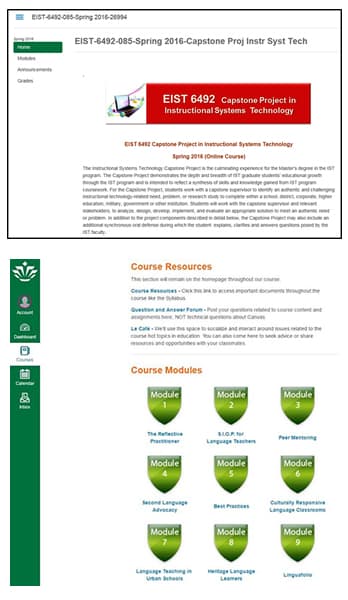
UNC Charlotte is transitioning to a new learning management system, Canvas; its adoption resulted after several months of study, including a pilot phase that involved more than 100 courses in 20 disciplines and 3,000 students.
“Starting in September 2015, the Learning Management System (LMS) Evaluation Committee, comprised of 35 faculty, staff and students, began exploring whether our current system Moodle was best serving the diverse instructional needs of our campus,” said Garvey Pyke, director of the Center for Teaching and Learning. “And, after exploring several options, Canvas was the committee’s unanimous choice.” Pyke lauded the engagement and effort put forth by the committee members, stating, “Every member of the committee was committed to finding the solution that most closely fits our University's goals and mission." The committee met bi-weekly for the fall and spring semester to discuss needs, review options and evaluate the choices.
Bobby Hobgood, director of the Language Resource Center in the Department of Languages and Culture Studies and an adjunct faculty member for the College of Education, has taught in seven different learning management system interfaces. As part of the pilot study, Hobgood discovered the features and tools of Canvas enabled him to create an experience that is more effective for students. “I think Canvas has a clean interface. So its basic architecture already supports an understanding that guides the users, both from a student and instructor perspective.”
Moving to Canvas is a progressive choice to meet students at their technological needs, noted Caroline Nowell, a student representative on the LMS Evaluation Committee. “I’m very excited about the mobile platform capacities Canvas offers. I have heard so many complaints from students about trying to access Moodle via their Web browsers on their phones and know the app will save students a lot of hassle.”
As part of its recommendation, the LMS Evaluation Committee cited several benefits of Canvas, including its reliability, adaptability, ease of use and relevance to the University’s instructional mission.
Kinesiology faculty member Joe Coyle teaches entirely online with nontraditional students who are working respiratory therapists of varying ages. He noted that his tech calls and emails dropped dramatically during the trial as the 24/7 Canvas help line works well for these students, who often work night shifts. He added that the “Speedgrader” option of Canvas “saves me about 50 percent of the time I spent grading assignments and discussions in Moodle.”
Florence Martin, associate professor and program director, instructional systems technology, was impressed with the ease of use of Canvas. “Including only a few navigation menu items helped keep the course entry point clear, and the module functionality let me create modules to include a variety of resources, such as content pages, assignments, quizzes, files and external URLs.”
As the University transitions to Canvas, Moodle will be available through May 15, 2017. The Center for Teaching and Learning will conduct workshops and provide additional support to aid faculty members in the use of Canvas. Workshops and trainings are scheduled and viewable on the CTL calendar.
Instructors who begin to work with Canvas will have access to resources provided by Canvas technicians, too.
“During the pilot, I used two different types of support,” said Hobgood. “One was live chat, the second was their online support guide for instructors. With respect to the live chat, my questions were answered in minutes, I was astounded that I received the answer so quickly, and it was clear. Plus, there was follow up. I received copies of the transcripts with the technician, and they were concerned I was satisfied. With the online support guides, they’re written in a language that is clear and easily understood. Moodle’s documentation is not as clear and to the same level of quality as Canvas.”